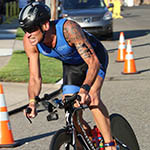
In a perfect world, we could all train as much as we like, as hard as we like, and have the time to recover to do it again whenever we like. But for most of us, life, family, work and other obligations get in the way of training and racing and add additional stressors and physiological costs. Balancing a full training load and racing to your fullest potential can be challenging skill to master. Here are a few tips for avoiding overtraining for triathlon to ensure you're on your A-game in time for your next race.
Know the Warning Signs
It may be time to adjust your training load and maybe even your racing if you experience more than three of these overtraining indicators:
• Fatigue
• Muscle/body aches and/or soreness
• A sudden drop in performance
• Insomnia or excessive sleepiness
• Illness (from decreased immune function)
• Irritability and moodiness (more than usual)
• Decreased appetite
• Weight loss
• Increased resting heart rate
• Decrease in heart rate variability
• A substantial drop in intensity
• Loss of enthusiasm for training
Get a Coach
Hiring an experienced coach who will program your training for you can take some of the guesswork out of your plan. A knowledgeable coach will also know the warning signs of overtraining and can modify your plan to accommodate your specific training and recovery needs.
Build in a Rest Day
If you have a coach, expect their training plan to include a day off. If you guide your own training, remember to give yourself a break. This may seem obvious, but if you’re training, you need time to recover—and not just overnight. A rest day, even if it is every other week, will allow your body to get some extra rest and not only prevent overtraining but burn out as well.
Keep a Training Log
Track your workouts: Record your performances, as well as how you feel after your training sessions. Note particularly challenging workouts that leave you feeling absolutely exhausted, and include all activities, even travel for work, as these non-training events may also affect your recovery.
Use Technology
Using a heart rate monitor can help guide you while you’re training and also let you know if you’re recovering efficiently, as heart rate is a reactive indicator of physiological stress. Other triathlon training tools, like a power meter, when used efficiently can help guide you so that you will be less likely to go too hard too often. After you establish a baseline for recovery heart rate, note any adverse changes—your waking and resting heart rate deviating from your norm—as this is an indicator of overtraining.
Listen to Your Body
If you’re constantly thinking about a day off from training because you’re sore, dragging and hungry, listen to your body. Be proactive and take a training break before you’re forced to take time off due to injury.
Eat Smart and Journal It
Nutrition while training and racing will get you across the finish line, but this is only a small part of the triathlon training equation. Keep a food journal, and document what nutrition works best for you. Don't forget to record when you're eating and drinking so you can finetune and optimize your recovery nutrition strategy.
Sleep Is Not Overrated
One perspective on overtraining is under-resting. Whether you're working out eight hours a week or 28 hours a week, you need to rest accordingly. Many wearable devices can help you track your sleep. Use technology not only for pacing your training and racing but also to monitor your recovery. If you can't get the sleep you need, you may need to adjust your training accordingly.
READ THIS NEXT: 8 Reasons You Feel Tired in Your Workouts


